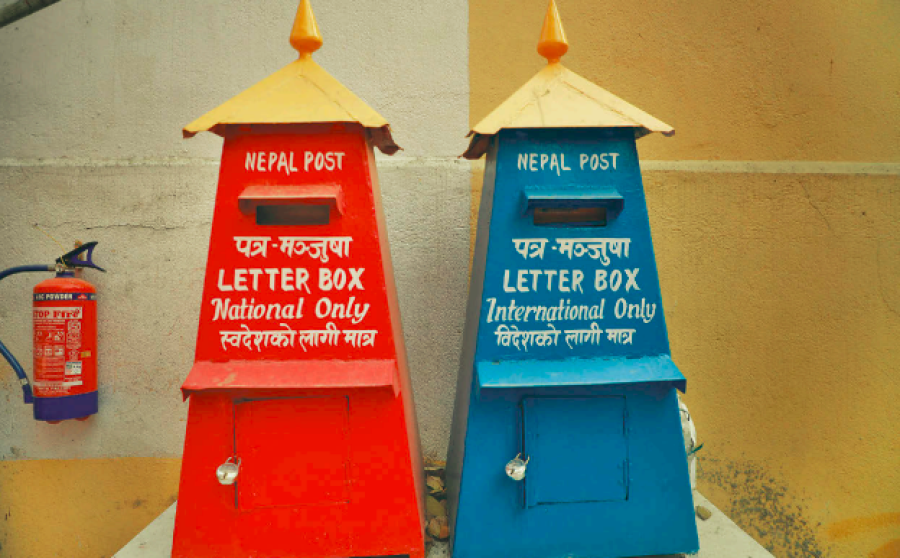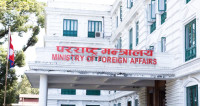National
Outbound postal service has stopped for a year now. Officials don’t know when it will resume
With Thai Airways bankrupt, there are legal complications to terminate existing contract with it. Services to India resumed only in February after having halted since March last year.
Srizu Bajracharya
About three weeks ago Harka Tamang went to the General Post Office at Dillibazar to send a package to a friend in Germany.
However, to his disappointment, Tamang was told that the post office was not taking outbound letters and parcels except to India.
“I was surprised that such an important service was not functioning well,” said the 50-year-old German-speaking tour guide. “Their reason was their carrier, Thai Airways, was not doing international flights.”
The suspension of international flights into the country in March last year meant that no letters or packages came in or went out from the country. While they started coming when international flights resumed in September, outbound posts could not.
“Our agreement was with Thai Airways so when everything came to a halt we were unable to continue our outbound service,” said Pradyumna Prasad Upadhyay, chief postmaster at the General Post Office.
Despite the resumption of flight services, people like Tamang have continued to be denied postal services since Thai Airways announced bankruptcy.
“Shouldn’t the government have sought a better solution by now,” asked the tour guide from Budhanilkantha.
According to Aabha Shrestha Karna, the director-general at the Postal Services Department, establishing another agreement for the outbound postal service is not as easy as one assumes even though they realise they are losing out on opportunities and people’s trust.
“We also need to look into connecting flights, ground entries and transits of airways to make such agreements,” said Karna.
Nepal Airlines is not an option as its services are not spread out to see it as one way of solving the problem at hand, she added.
According to Ramesh Katuwal, section officer at the department, Nepal’s postal service does not use cargo flights but depends on passenger flights as a result of which the service has been affordable to the general public.
“Yes, we could have partnered with more airlines but our rules don’t allow us to work with different airlines,” Katuwal said. “I think years back we used to collaborate with different airlines but later we streamlined it for better management.”
Almost every day, the General Post Office gets 50 to 60 calls inquiring when it will resume its international services, according to officials.
“We ourselves have been very unhappy with our present situation, as we have not been able to provide the people with our services,” said Samjhana Devkota, section officer at the General Post Office.
For most people, the postal service is one of the most affordable public facilities providing mail services, print distributions, money transfer, express mail and parcel services.
Shraddha Gautam, 24, has not been able to send letters to her pen friend in the United Kingdom because private courier services are too expensive.
“I definitely would have paid the amount if it was for an important official document,” she said.
For many institutions and companies, the General Post Office’s service has been the authentic source of communication, information and relation building as well. It has also been the authentic channel to distribute YouTube’s certification to YouTubers and to send out legal papers from courts.
“From legal documents to authentic official paper works, the post office is one of the most trusted institutions,” said Upadhyay, the chief postmaster.
Despite its importance, a reflection of the authorities’ attitude to providing postal services is the fact that services to India restarted only earlier this month even though air services with the southern neighbour resumed in December.
As for the rest of the world, the contractual situation with Thai Airways is an obstacle.
“We have a two-year contract with Thai Airways, and we didn’t want to scrap the agreement right away,” said Karna, the director general. “We were waiting to hear from them given the terms of the relationship.”
According to the department, it has been working with Thai Airways for about ten years.
“Our department establishes this relationship through a contractual global tender and breaching that contract means facing consequential lawsuits,” said Katuwal. “Therefore, we thought it would be best for us to hear from them first.”
The department is yet to hear from the bankrupt airlines.
The lack of urgency on the part of the government despite no international posts leaving the country is because of the lack of interest shown in the service by the government, according to postal officials.
“In India, the postal services are looked at with more respect and are treated with more seriousness. And authorities there are proactive in providing their facilities,” said Chudamani KC, information officer of the General Post Office. “But here, no one really sought to give us that responsibility of providing service to people. Because our office relies on direction from the Department of Postal Services and above, we were unable to do anything.”
The General Post Office has been urging the department to a swift decision, according to him.
The government has been losing revenue too.
In the first seven months of the fiscal year 2019-20, the revenue collection by the postal services was over Rs90 million of the total of Rs114 million for the whole year. But with the international service cut off in March 2020 continuing till now, the revenue stands at less than Rs40 million in the first seven months of the current fiscal year 2020-21.
The number of letters and packages the postal service has been handling has also come down over the past few years.
In the fiscal year 2018-2019, the General Post Office recorded about 914,298 deliveries including registry, express mail service and parcels for Kathmandu. And in 2019-2020, it recorded 100,355 deliveries while this ongoing fiscal year just about 49,768 deliveries exclusive of outbound deliveries were recorded.
The loss for the government has meant gain for the private sector.
“Definitely, this has benefitted other courier and parcel businesses but at the same time made things more difficult for the people as DHL and other services are quite expensive,” said Upadhyay.
But it is not just the pandemic that is to blame for the deteriorating quality of services in the post office, according to its users.
Gautam, who has a pen pal in the United Kingdom, has a story to tell.
She had used the post office to send letters to different ministries to get clarification, information and sometimes to make recommendations on government’s programmes. She once tested the performance of the postal service by sending herself a letter when she realised the offices had not received her letters.
“But I never received my own letter. This was in 2018, I think. For the most part, the postal office’s service has been unreliable and questionable. I never even received the official letter from my college although my college had sent it twice a few years back,” she said. “At the time, their response when I confronted them at their Sundhara office was to direct me to a room full of thousands of letters.”
The postal service, however, is now preparing to address the problems of timely delivery and transparency of deliveries by introducing a new procedure to deliver mails and packages using Google Plus Code, an alphanumeric code that can be combined with a locality through latitude and longitude coordinates.
But people like Gautam are still sceptical of the government's priority towards the service.
In the past, however, the postal service was regarded as one of the most important services by the government which was used by almost everyone for legal, official and licensed communication and information to writing letters to friends and families—it was a meaningful channel for conversations. Many people wrote letters and sent parcels regularly and also had their own post box.
One of them was Prakash Deep Shrestha, 62, a lyricist.
“I loved writing letters to people and it was something very popular in those days. When I went to Nepalgunj after I completed college, I used to write letters to my friends here in Kathmandu and even to actors like Amitabh Bachhan, Jeetendra and Shashi Kapoor,” said Shrestha. “And I still have the letters with me. I think the postal service gave me a lot of memories to value.”
The postal service has over 18,000 government employees spread out across the country and the various postal offices have their reach even in far-off regions.
“The connection we have to different places is really established well and the government could have used this channel to operate their various services, even in the pandemic they could have used this connection to distribute reliefs,” said Upadhyay.
Karna, the director general, too admits that the postal services have not been exploited to thier full capacity.
It’s been over two years since the department has been pushing for a Postal Act, which will give it more autonomy.
According to Karna, this will allow the department to restructure its institution and make it more IT-based to compete in current times.
“I wouldn’t say we have not been prioritised but because the process requires a change in the structure and the way we work, this requires time and we believe going forward things will be better and our services will be more effective and competitive,” said Karna. “We want to make the postal service more accessible and increase commercial activities to make a significant impact on the country’s revenue.”
But for the moment, authorities have no answer for when outbound services will restart even as inbound postal services began with the resumption of international flights in the country on September 1.
All Karna could say was, “But we are trying our best to come up with a solution for we understand this is an important service.”




 9.92°C Kathmandu
9.92°C Kathmandu















